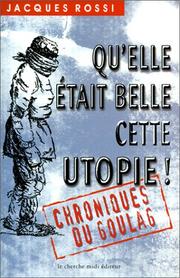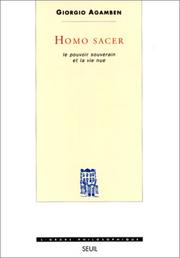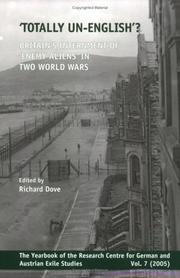| Listing 1 - 10 of 18 | << page >> |
Sort by
|

ISBN: 2862747777 Year: 2000 Publisher: Paris Cherche Midi
Abstract | Keywords | Export | Availability | Bookmark
 Loading...
Loading...Choose an application
- Reference Manager
- EndNote
- RefWorks (Direct export to RefWorks)
Political philosophy. Social philosophy --- anno 1900-1999 --- Russian Federation --- Concentration camps --- Prisoners --- Camps de concentration --- Prisonniers --- Russia --- Internment camps
Book
ISBN: 3170072528 Year: 1982 Publisher: Stuttgart Kohlhammer
Abstract | Keywords | Export | Availability | Bookmark
 Loading...
Loading...Choose an application
- Reference Manager
- EndNote
- RefWorks (Direct export to RefWorks)
Concentration camps --- Death camps --- Detention camps --- Extermination camps --- Internment camps --- Detention of persons --- Military camps --- History --- Criminal law. Criminal procedure --- History of Germany and Austria --- anno 1900-1999
Book
ISBN: 9789046611791 Year: 2022 Publisher: Apeldoorn Maklu
Abstract | Keywords | Export | Availability | Bookmark
 Loading...
Loading...Choose an application
- Reference Manager
- EndNote
- RefWorks (Direct export to RefWorks)
De concentratiekampen zijn gesloten. Auschwitz is voorbij. Elk jaar herdenken we en zeggen we dat we dit nooit meer willen. Maar waarom hebben we dan nog altijd systemen in onze Westerse samenleving waarin mensen in mensonterende omstandigheden zitten opgesloten? Is Auschwitz wel echt voorbij? Om hier een antwoord op te vinden, wordt in dit boek een vergelijking gemaakt tussen de kampstructuur van Auschwitz en de grondstructuur van het huidige detentiesysteem in de Verenigde Staten. Dit detentiesysteem herbergt 2.3 miljoen schuldige of onschuldige mensen in mensonterende omstandigheden. Wat is het verschil in menselijke waardigheid tussen Auschwitz en dit detentiesysteem als zij door dezelfde onderliggende structuur wordt vernietigd? In dit boek wordt onderzocht wat de universele kenmerken zijn van de grondstructuur van beide systemen. Inzicht in deze universele kenmerken kan leiden tot een letterlijk structurele verandering en aanzetten tot onderzoek naar andere onderliggende structuren, zoals het Nederlands detentiesysteem of vluchtelingencentrum Ter Apel. Kortom, inzicht in onderliggende structuren van uitsluitende systemen leidt tot werkelijke verandering, en daarmee tot herstel van de menselijke waardigheid.
General ethics --- Legal theory and methods. Philosophy of law --- Human rights --- Criminology. Victimology --- United States --- Comparative law --- Droit comparé --- Internment camps --- Camps d'internement --- Prisons --- Imprisonment --- Emprisonnement --- Nazi concentration camps --- Camps de concentration nazis --- United States of America
Book
ISBN: 9780739192429 9780739192436 0739192434 0739192426 1498508634 9781498508636 Year: 2014 Publisher: Lanham, Md Lexington Books
Abstract | Keywords | Export | Availability | Bookmark
 Loading...
Loading...Choose an application
- Reference Manager
- EndNote
- RefWorks (Direct export to RefWorks)
Experiences of Japanese American Women during and after World War II examines the experiences of Japanese American women who were in internment camps during World War II and after. Precious Yamaguchi follows these women after they were released and shows how they tried to rebuild their lives after losing everything.
J4209.411 --- J4176.80 --- Japan: Sociology and anthropology -- communities -- racial and ethnic -- emigrants -- United States --- Japan: Sociology and anthropology -- gender roles, women, feminism -- history --- Sociology of minorities --- Criminal law. Criminal procedure --- anno 1930-1939 --- anno 1940-1949 --- United States --- Japanese Americans --- World War, 1939-1945 --- Kibei Nisei --- Nisei --- Ethnology --- Japanese --- Evacuation and relocation of Japanese Americans, 1942-1945 --- Internment of Japanese Americans, 1942-1945 --- Relocation of Japanese Americans, 1942-1945 --- Evacuation and relocation, 1942-1945. --- Japanese Americans. --- Concentration camps --- Social conditions. --- Evacuation of civilians --- Forced removal of Japanese Americans, 1942-1945 --- Evacuation and relocation, 1942-1945 --- Forced removal of civilians --- Forced removal and internment, 1942-1945. --- United States of America
Book
ISBN: 9789046611883 Year: 2023 Publisher: Apeldoorn Maklu
Abstract | Keywords | Export | Availability | Bookmark
 Loading...
Loading...Choose an application
- Reference Manager
- EndNote
- RefWorks (Direct export to RefWorks)
Comparative law --- Droit comparé --- Internment camps --- Camps d'internement --- Prisons --- Imprisonment --- Emprisonnement --- Nazi concentration camps --- Camps de concentration nazis --- General ethics --- Legal theory and methods. Philosophy of law --- Human rights --- Criminology. Victimology --- United States of America --- Comparative law. --- Droit comparé. --- Camps de concentration

ISBN: 2701119332 9782701119335 Year: 1995 Publisher: Paris Belin
Abstract | Keywords | Export | Availability | Bookmark
 Loading...
Loading...Choose an application
- Reference Manager
- EndNote
- RefWorks (Direct export to RefWorks)
Comparative literature --- Thematology --- Concentration camps in literature --- Politics and literature --- Literature, Modern --- Camps de concentration dans la littérature --- Politique et littérature --- Littérature --- History and criticism --- Histoire et critique --- -Politics and literature --- Literature --- Literature and politics --- Modern literature --- Arts, Modern --- Political aspects --- Camps de concentration dans la littérature --- Politique et littérature --- Littérature --- Internment camps in literature --- Literature, Modern - 20th century - History and criticism
Book
ISBN: 9780670023325 0670023329 Year: 2012 Publisher: New York, N.Y. Viking
Abstract | Keywords | Export | Availability | Bookmark
 Loading...
Loading...Choose an application
- Reference Manager
- EndNote
- RefWorks (Direct export to RefWorks)
Twenty-six years ago, Shin Dong-hyuk was born inside Camp 14, one of five sprawling political prisons in the mountains of North Korea. This is the gripping, terrifying story of his escape from this no-exit prison-- to freedom in South Korea.
Concentration camps --- Forced labor --- Political prisoners --- K9125.90 --- K9349.95 --- Prisoners of conscience --- Prisoners --- Compulsory labor --- Conscript labor --- Labor, Compulsory --- Labor, Forced --- Employees --- Death camps --- Detention camps --- Extermination camps --- Internment camps --- Detention of persons --- Military camps --- Korea: Genealogy and biography -- biography -- North Korea (1945- ) --- Korea: Social policy and pathology -- criminology -- crime and punishment, penology -- North Korea --- Sin, Tong-hyŏk, --- Sin, In-gŭn, --- 신 동혁, --- Shin, Dong-hyuk, --- Korea (North) --- Social conditions. --- History of Asia --- North Korea
Book
ISBN: 9782072729645 2072729645 Year: 2021 Volume: 660 Publisher: [Paris] Gallimard
Abstract | Keywords | Export | Availability | Bookmark
 Loading...
Loading...Choose an application
- Reference Manager
- EndNote
- RefWorks (Direct export to RefWorks)
" 'Il restera les livres, disait Jorge Semprun. Les récits littéraires, du moins, qui dépasseront le simple témoignage, qui donneront à imaginer, même s'ils ne donnent pas à voir... Il y aura peut-être une littérature des camps... je dis bien : une littérature, pas seulement du reportage...' Les textes réunis dans ce volume ont été écrits entre 1946 et 1994 par des survivants des camps nazis. Ces survivants partagent un même dessein : témoigner de l'expérience qui a été la leur, la rendre mémorable dans une langue - le français - qu'ils ont reçue en héritage ou dont ils ont fait le choix. Moins en rapportant des épisodes extrêmes, des moments limites, qu'en rendant compte de l'ordinaire du temps concentrationnaire, sur quoi la mort règne et dans lequel s'effacent les formes et figures de l'humain. Tous constatent que les mots manquent pour exprimer une telle insulte à l'espèce humaine. 'On ne se comprenait pas' (Antelme). 'Il n'y a rien à expliquer' (Cayrol). L'écriture touche là aux limites de son pouvoir. Dans une entreprise de cet ordre, impossible de satisfaire aux exigences de transparence et de véridicité généralement associées au langage quand il se fait témoignage. Pour que l'indéchiffrable monde des camps échappe, si peu, si partiellement que ce soit, à l'incommunicable, pour que quelque chose existe qui relève de la transmission, chacun de ces écrivains doit explorer l'envers du langage et approfondir la 'réalité rêvée de l'écriture' (Semprun). C'est à 'la vérité de la littérature' (Perec) qu'il revient de préserver la vérité de la vie. Littérature. Le mot peut paraître sans commune mesure avec l'objet de tels récits. Il ne choquait pas leurs auteurs. C'est que la part littéraire ne relève pas chez eux d'un savoir-faire ou d'une rhétorique, moins encore d'un désir d'esthétisation. Mais d'un souci éthique de la forme, d'une morale du style."--Publisher's website
Nazi concentration camps --- Nazi concentration camps in literature --- Holocaust, Jewish (1939-1945) --- World War, 1939-1945 --- Camps de concentration --- Concentration camps --- Thematology --- anno 1940-1949 --- Auschwitz --- Prisoners of war --- Holocaust, Jewish (1939-1945). --- Guerre mondiale, 1939-1945 --- Prisonniers de guerre --- Holocauste, 1939-1945. --- Internment camps. --- Prisoners of war. --- Prisoners and prisons, German. --- Concentration camps. --- Biography --- Prisonniers et prisons des Allemands. --- Camps d'internement. --- Biographies --- Auschwitz (Concentration camp). --- 1939-1945. --- France. --- Germany. --- Guerre mondiale, 2e -- 1939-1945 --- Camp de concentration

ISBN: 2020256452 9782020256452 2020611147 9782020611145 Year: 2003 Publisher: Paris Seuil
Abstract | Keywords | Export | Availability | Bookmark
 Loading...
Loading...Choose an application
- Reference Manager
- EndNote
- RefWorks (Direct export to RefWorks)
Human Rights --- State, The --- Sovereignty --- Religion and politics --- Right to life --- Concentration camps --- Human rights --- Droits de l'homme (Droit international) --- Etat --- Souveraineté --- Religion et politique --- Droit à la vie --- Camps de concentration --- Droit et politique --- Pouvoirs exceptionnels --- Violence politique --- Religion and politics. --- Political philosophy. Social philosophy --- Droit et politique. --- Pouvoirs exceptionnels. --- Violence politique. --- Constitutional law --- Filosofie --- Politiek --- Westen --- Pouvoir (philosophie). --- Mort --- Pouvoir (sciences sociales). --- Fascisme. --- Vie. --- Souveraineté. --- Sacré --- Droit --- Anthropologie. --- Aspect social. --- Philosophie --- Histoire. --- Pouvoir (philosophie) --- Pouvoir (sciences sociales) --- Souveraineté. --- Sacré --- Internment camps --- Oudheid --- China --- Romeinse Rijk --- Hellenisme --- Griekenland --- Hellas --- Film --- Literatuur --- Muziek --- Schilderkunst --- Maatschappij --- Tekenkunst --- Vlaanderen --- Vlaams --- Emigratie --- Vrouw

ISBN: 9401201382 9789401201384 1423791576 9042016582 9789042016583 9781423791577 Year: 2005 Publisher: Amsterdam Rodopi
Abstract | Keywords | Export | Availability | Bookmark
 Loading...
Loading...Choose an application
- Reference Manager
- EndNote
- RefWorks (Direct export to RefWorks)
"The internment of ‘enemy aliens’ by the British government in two world wars remains largely hidden from history. British historians have treated the subject – if at all – as a mere footnote to the main narrative of Britain at war. In the ‘Great War’, Britain interned some 30,000 German nationals, most of whom had been long-term residents. In fact, internment brought little discernible benefit, but cruelly damaged lives and livelihoods, breaking up families and disrupting social networks. In May 1940, under the threat of imminent invasion, the British government interned some 28,000 Germans and Austrians, mainly Jewish refugees from the Third Reich. It was a measure which provoked lively criticism, not least in Parliament, where one MP called the internment of refugees ‘totally un-English’. The present volume seeks to shed more light on this still submerged historical episode, adopting an inter-disciplinary approach to explore hitherto under-researched aspects, including the historiography of internment, the internment of women, deportation to Canada, and culture in internment camps, including such notable events as the internment revue What is Life!"--Provided by publisher.
Noncitizens --- World War, 1939-1945 --- World War, 1914-1918 --- Concentration camps --- European War, 1939-1945 --- Second World War, 1939-1945 --- World War 2, 1939-1945 --- World War II, 1939-1945 --- World War Two, 1939-1945 --- WW II (World War, 1939-1945) --- WWII (World War, 1939-1945) --- History, Modern --- Aliens --- Enemy aliens --- Expatriates --- Foreign citizens (Aliens) --- Foreign population --- Foreign residents --- Foreigners --- Resident aliens --- Unnaturalized foreign residents --- Persons --- Deportees --- Exiles --- Immigrants --- Refugees --- History --- Social conditions. --- Legal status, laws, etc. --- Polemology --- Great Britain --- Internment camps --- Illegal aliens --- Illegal immigrants --- Non-citizens --- Unauthorized immigrants --- Undocumented aliens --- Undocumented immigrants
| Listing 1 - 10 of 18 | << page >> |
Sort by
|

 Search
Search Feedback
Feedback About UniCat
About UniCat  Help
Help News
News